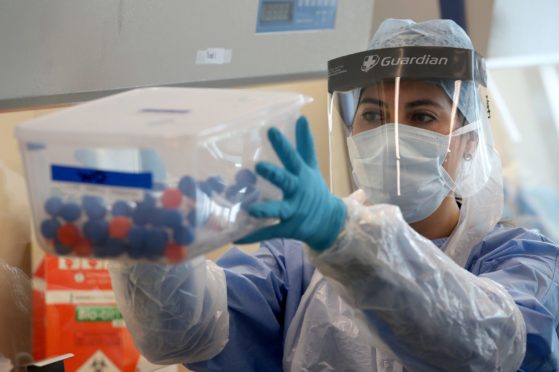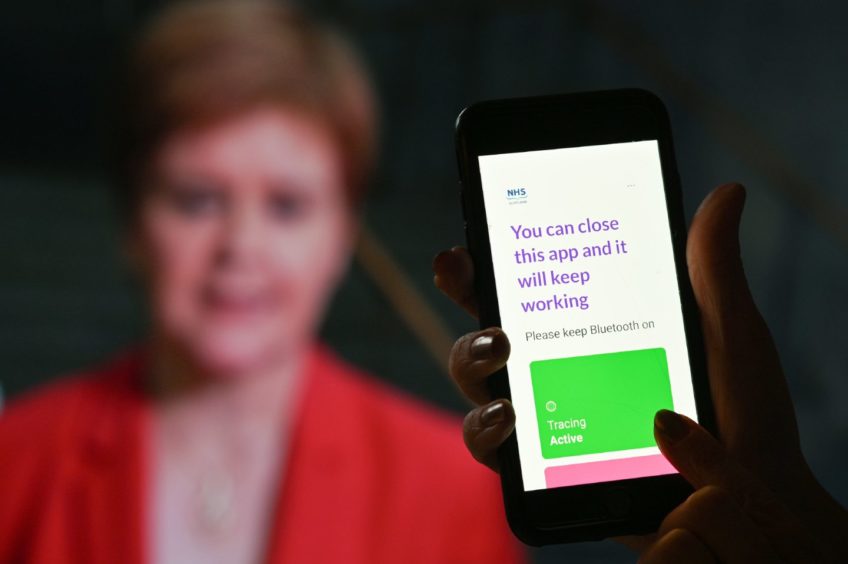Nicola Sturgeon is seeking “urgent talks” with the UK Government over a backlog of coronavirus test results after ministers south of the border proposed limiting access to testing slots in Scotland to tackle the issue.
The first minister said she has “very serious concerns” that problems with the UK testing network “is starting to impact on the timeous reporting of Scottish results”.
Ms Sturgeon announced an additional 70 positive cases of Covid-19 had been confirmed in Scotland overnight on Monday, representing 2.7% of those newly tested, but warned the data behind the number was likely “not yet complete”.
The figure is substantially lower than the 244 announced on Sunday, and the SNP leader said she was aware other parts of the UK were experiencing similar issues on Monday morning and were seeking to resolve these urgently.
Ms Sturgeon revealed proposals to limit access to testing in Scotland to ease pressure had been rejected during discussions between health secretary Jeane Freeman, her counterpart at Westminster, Matt Hancock, and the other devolved administrations.
The plan to reduce slots at mobile testing units and regional testing centres was kicked into touch following talks at the weekend and Ms Sturgeon confirmed there did not appear to be any significant issue with people in Scotland accessing slots.
“We’ve been raising these concerns with the UK Government in recent days and, indeed over the weekend, the health secretary managed to resist a move to limit access to testing slots, and mobile testing units and regional testing centres,” she said.
“However, this apparent delay in turnaround is causing us concern and therefore we’ll be seeking to escalate these discussions with the UK Government.
“Let me stress that we are very keen to play our full part in addressing these issues and finding solutions to them urgently.
“But we need the UK Government to share the full scale and nature of the issues they are facing, and the impact that they are having on Scotland in order that we can collectively, and very quickly, find solutions.”
The “vast bulk” of Covid-19 tests in Scotland are carried out as part of a UK-wide network of test centres and mobile testing units.
Speaking at the Scottish Government’s coronavirus briefing on Monday, Ms Sturgeon suggested the return of English schools may have contributed to a surge of demand, similar to the one seen in Scotland last month.
On Sunday, England’s Department of Health and Social Care (DHSC) said the Test and Trace system was working and that “our capacity is the highest it has ever been”.
However, services have been experiencing a significant demand for tests, including from people who do not have symptoms and are not otherwise eligible.
New “rule of six” restrictions came into force in Scotland on Monday meaning social gatherings in both indoor and outdoor settings, including pubs and restaurants, have now been limited to a maximum of six people from two households.
Ms Sturgeon said the number of new cases was trebling roughly every three weeks, a pattern which is “not sustainable”, and that transmission across Scotland was now at a level “higher than we can be comfortable with”.
The first minister said she did not want Scotland to become a “spying on your neighbours” society but said those concerned about others “flagrantly breaching the rules” – such as by hosting house parties – should report it to the police.
Ms Sturgeon called on Scots to act “in the spirit of collective solidarity” to reduce the number of incidences where officers have to get involved.
She said: “We can’t get through this as five million, or just above five million individuals, we can only get through this as a society pulling together.
“So I don’t want us to see it, if we can at all avoid it, as spying on your neighbours or reporting your neighbours to the police.
“I want all of us to come at this from – why are we doing this? It’s to protect each other. And I think that’s served us well so far, and I think it will continue to serve us well.”
However, Ms Sturgeon said that if a person is “worried that somebody close to you, or physically in close proximity to you, or somebody you’re aware of is flagrantly breaching the rules… then the police are there to deal with that”.
“It shouldn’t be for you to have to go and deal with that, it should be for the police to come and they will deal with it in their proportionate and sensitive way, and where necessary they will take enforcement action,” she added.


